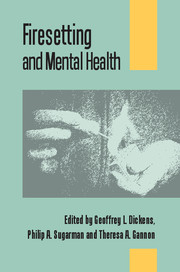Book contents
- Frontmatter
- Contents
- List of figures, tables and boxes
- List of contributors
- Preface
- Part I Theory and research
- Part II Practice and law
- 9 Legal perspectives on arson
- 10 Assessment of firesetters
- 11 Bushfire and wildfire arson: arson risk assessment in the Australian context
- 12 Arson: treatment and interventions
- 13 Arson and mental health: case reports from psychiatric practice
- 14 Fire risk and fire safety in psychiatric care
- Index
13 - Arson and mental health: case reports from psychiatric practice
from Part II - Practice and law
Published online by Cambridge University Press: 02 January 2018
- Frontmatter
- Contents
- List of figures, tables and boxes
- List of contributors
- Preface
- Part I Theory and research
- Part II Practice and law
- 9 Legal perspectives on arson
- 10 Assessment of firesetters
- 11 Bushfire and wildfire arson: arson risk assessment in the Australian context
- 12 Arson: treatment and interventions
- 13 Arson and mental health: case reports from psychiatric practice
- 14 Fire risk and fire safety in psychiatric care
- Index
Summary
Most crimes of arson are committed by a small number of prolific offenders, many of whom are under 18 and who commit other offences also. The majority of these individuals do not experience mental illness. Research does, however, place arson in the same category as homicide in respect of the magnitude of the increase in risk of such offending that mental illness confers (Anwar et al, 2011). This increase is much higher than those reported for other violent crimes. Intellectual disability in particular also greatly increases a person's risk of committing arson. Mental health professionals therefore frequently encounter arsonists of both a dangerous and a recidivist nature. The courts often seek specialist advice when sentencing arsonists.
In formulating risk management plans it is frequently necessary to put in place approaches to rehabilitation and recovery that address the criminogenic needs which pertain to firesetting. The literature distinguishes two broad groups of such interventions, namely educational approaches (seeking to inform individuals about the risks of fire) and psychosocial approaches (with the aim of modulating some aspect of precipitant or behaviour) (Palmer et al, 2005).
This chapter presents two anonymised case studies to illustrate the ways in which offences of arson can arise in psychiatric patients. Their multidisciplinary treatment and management are described in detail. All personal details, dates, locations and other information that might identify the individuals in question have been either omitted or made fictitious to ensure no breach of confidentiality.
Case 1. Psychosis driving arson
Mr S is the son of two African professionals. His parents have, however, never lived together. Mr S was raised by his mother and had only sporadic contact with his father. There is a family history of serious mental illness, although not in first-degree relatives. There is no known family history of criminal behaviour.
Mr S was born by normal delivery and attained normal developmental milestones. From the age of 6 months he attended day nursery while his mother worked. His mother describes him as a respectful child who was not initially aggressive in character. From an early age he found it difficult to concentrate in class and became a disruptive pupil, however. He played truant and fought on a number of occasions, often being suspended. He received special support at times during his education and performed most successfully in small classes.
- Type
- Chapter
- Information
- Firesetting and Mental Health , pp. 240 - 253Publisher: Royal College of PsychiatristsPrint publication year: 2012



